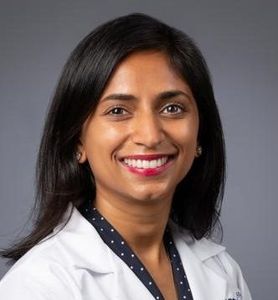Faculty Spotlight: Yachana Kataria, PhD

Yachana Kataria, PhD, is an Assistant Professor of Pathology & Laboratory Medicine at Boston University Chobanian & Avedisian School of Medicine. She joined the faculty in 2018 after completing a fellowship at Boston Children’s Hospital in Clinical Chemistry. Dr. Kataria also serves as the Medical Director of Clinical Chemistry and is a part of the Pathology Program admissions & steering committee.
Tell us a bit about your journey to Boston University. How long have you been involved with the Pathology program?
I completed my PhD in Pathology at University of Illinois at Chicago in 2015. I went on to complete my fellowship at Boston Children’s Hospital in Clinical Chemistry. I started at Boston University as an Assistant Professor of Pathology and Laboratory Medicine and as the Medical Director of Clinical Chemistry in 2018.
What drew you to working at Boston University?
The fact that BU is a leading institution in the heart of a vibrant city. BU provides a high-quality education with a strong emphasis on research and experiential learning. Beyond that, it also provides numerous opportunities for networking, career development and community engagement.
Tell us about your current role in the Master of Science in Pathology Laboratory Sciences program at BU.
Beyond being part of the admissions & steering committee for the program, I serve as a mentor for the students matriculated in the program. I enjoy having students think through problem solving and helping them through their thesis work.
In your opinion, what is the value of pursuing a master’s degree in pathology? What is exciting about working in the field?
A degree in pathology offers many opportunities in the field while providing a fundamental knowledge of pathophysiology of disease. A degree in pathology can lead to a range of career paths, as it is a dynamic field that constantly evolves with new discoveries and technologies. Pathology also plays a crucial role in public health by identifying risk factors, assessing the impact of risk factors on disease, and promoting public health policies.
Students from on our program have leveraged our program to go on to be admitted to PhD programs or professional schools such as medical and dental schools. My own graduate student went on to work at a biotechnology company. The faculty, including myself, are always available to help the students to pave their path forward.
What aspects of the BU MS in Pathology Laboratory Sciences program make it stand out?
Some factors that help make the BU pathology program stand out are the comprehensive curriculum, research opportunities for students to engage in scientific inquiry and work alongside with faculty members. The program promotes collaboration and provides opportunities to work with other disciplines and clinical exposure within the department, as well. Our faculty foster a sense of community while making significant contributions to the field.
What is your favorite part about being a faculty member within the master’s program?
My favorite part is being part of the BU and BMC community, which includes staff, students and faculty helping contribute to teaching, research, and clinical service. We all collectively find ways to give back to the community.
What advice or words of wisdom would you give to individuals who are considering pursuing an advanced degree in pathology?
To keep your eyes and mind open. I have an undergraduate degree in Chemistry, and I didn’t know much about Pathology initially. The more I learned about it, the more possibilities I saw for myself in this field.